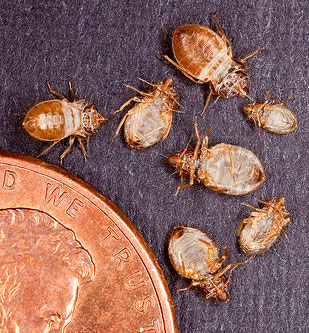Bostonians are Becoming Bed Bug Savvy!
By Chris Williams on April 3, 2014.

The penny in this photo provides a sense of scale to the size of bed bug skins collected for analysis by U.S. Department of Agriculture scientists.
Although bed bugs are still on the increase around the nation, Boston has some good news to report. The number of bed bug complaints in Boston has dropped 16%, from 410 in 2012, to 344 in 2013. “A lot of the decrease in cases is due to education,” said John Meaney, director of the Environmental Services Unit, Department of Inspectional Services.
People have become more savvy about bed bugs. They know how to protect themselves and their belongings when they travel. Certainly more people now know what a bed bug looks like. Hopefully people are intervening earlier when they discover that they have bed bugs. It doesn’t take long for a couple of bed bugs to turn into hundreds.
Typically, a female bed bug will lay 5-7 eggs/week. She can continue to lay eggs throughout her lifetime as long as she is able to feed regularly on blood and has the opportunity to mate periodically. During her 6-18 month lifespan, she can deposit a total of 200-500 viable eggs in your bed and in nearby cracks and crevices. Eggs hatch in 7-10 days and even the tiny nymphs that emerge search for human blood to feed on.
Bed Bugs Can Move From Room to Room – No Problem
Add to that the fact that bed bugs travel. Not only do they hitchhike on belongings to get to new locations, but they are perfectly capable of trotting along on their own 6 little legs to infest new sites. An adult bed bug can travel about 4 feet per minute. A bed bug foraging at night can travel more than 20 feet from its daytime hiding place.
In an apartment, bed bugs can move from room to room, and more disturbingly, they can move from apartment to apartment. Bed bugs have been known to follow pipe chases and electrical lines through walls and they will even crawl under a door and walk down the hallway. A female bed bug full of eggs dispersing to a new location away from the initial infestation can easily infest a new area or a new apartment.
The Massachusetts Sanitary Code and Bed Bug Extermination
Apartment-dwelling Bostonians should know about their local regulations concerning bed bugs. The Massachusetts Sanitary Code, under the Massachusetts Department of Public Health, specifies that the manager of a dwelling containing two or more units is responsible for maintaining it and its premises free of pests and is responsible for exterminating pests. Lease agreements should include a provision for the building owner to enter the premises of a unit during reasonable hours for the purposes of inspection, pest extermination or repairs. Hiring a licensed professional with bed bug control experience is highly recommended and in some communities may be required. [See Protocols for the Prevention and Control of Bed Bugs in Multiunit Housing for more information on bed bugs in Massachusetts]